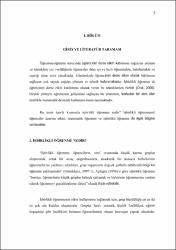| dc.contributor.advisor | Varank, İlhan | |
| dc.contributor.author | Kuzucuoğlu, Gürkan | |
| dc.date.accessioned | 2015-03-25T12:44:26Z | |
| dc.date.available | 2015-03-25T12:44:26Z | |
| dc.date.issued | 2006 | |
| dc.date.submitted | 2006 | |
| dc.identifier.uri | http://hdl.handle.net/11630/3321 | |
| dc.description.abstract | Bu çalışmanın amacı, işbirlikli öğrenme yönteminin ilköğretim beşinci sınıf öğrencilerinin matematik dersindeki başarılarına etkisini incelemektir.
Araştırma 2005 - 2006 öğretim yılı birinci yarıyılında, Ege bölgesindeki bir il merkezinde yer alan ilköğretim okulunda öğrenim gören 68 beşinci sınıf öğrencisi üzerinde gerçekleştirilmiştir.
Araştırmada bir deney bir de kontrol grubu oluşturulmuştur. Kontrol grubunda geleneksel öğretim yöntemleri, deney grubunda ise işbirlikli öğrenme tekniklerinden birlikte öğrenme uygulanmıştır. Kontrol gruplu ön test – son test deney deseni ile son test kontrol grubu dizaynının uygulandığı araştırma dört hafta sürmüştür.
Araştırma verileri, öğrenci başarısını ölçmek için geliştirilen başarı testi ile toplanmıştır. Ayrıca, deney sınıfındaki öğrencilerin denel işlem sırasında işbirlikli öğrenmenin gerektirdiği davranışları, kendi görüşlerine göre gösterip göstermemelerinin ve grup üyelerinin işbirliği içinde çalışma becerilerinin cinsiyet ile ilişkilerini belirlemek amacıyla deney sonunda, grup çalışması aktivitesi davranış öz değerlendirme formu ve grup çalışması aktivitesi grup değerlendirme formu uygulanmıştır.
Araştırma verilerinin analizinde, Aritmetik Ortalama, Standart Sapma, t-Testi ve Mann Whitney U-Testi kullanılmıştır.
Araştırmanın sonunda, ilköğretim beşinci sınıf matematik dersinde, işbirlikli öğrenme tekniklerinden birlikte öğrenmenin uygulandığı deney grubu ile geleneksel öğretim yönteminin uygulandığı kontrol grubunun erişi düzeyleri arasında anlamlı bir farklılık olmadığı ortaya çıkmıştır. Ancak deney ve kontrol grupları arasındaki farkın anlamlı olmamasıyla birlikte istatistiksel olarak son test puanlarına göre deney grubunun başarı ortalamasının, kontrol grubunun başarı ortalaması üstünde olduğu tespit edilmiştir. Ayrıca, deney sınıfındaki öğrencilerin denel işlem sırasında işbirlikli öğrenmenin gerektirdiği davranışları, kendi görüşlerine göre gösterip göstermemeleri arasında cinsiyet değişkeni açısından sadece dördüncü soruda anlamlı bir farklılık olduğu bulunmuştur. Diğer beş soruda ise anlamlı bir farka rastlanmamıştır. Deney sınıfındaki grup üyelerinin denel işlem sırasındaki işbirliği içinde çalışma becerileri arasında ise cinsiyet değişkeni açısından sekiz soruda da anlamlı bir farklılık olmadığı tespit edilmiştir. | en_US |
| dc.description.abstract | The aim of this study is researching the effect of cooperative learning methods on the fifth grade students in primary schools.
This research was done taking 68 students into account at a city centre in the Egean Region in 2005 – 2006 education year, first term.
For this research, an experimental group and a control group were chosen. Control group was taught using traditional teaching methods and the experiment group was taught using cooperative learning methods. The control group’s research which was sarried out with first – tests, last – tests, experiment kinds and the last test control group design, lasted 4 weeks.
The researchal data was obtained by using a success test which was developed to find out student’s success degree. Besides; at the end of the experiment; group work activities group evalvation form and group work activity behaviour self evalvation form was carried out to find out whether the subjects’(of experiment) behaviours are as needed for the cooperative learning methods, cooperative study skills of group members, their sexes and relations.
Taking the Arithmetical average, Standard deviation, t–Test and Mann Whitney U-Test were used for research data analysis.
At the end of the research, the result is that there isn’t an effective difference between the raditional method groups and cooperative groups learning degree. But; although the difference between the experimental and control groups isn’t important, according to the last tests results; experimental group’s success is higher than control group’s success. Besides this; it was found that the effect of sexual differences on behaviours needed cooperative learning independently at the time of the experimental process was seen at only the fourth question. But it wasn’t found any differences at the other 5 guestions. And the research result shows that there isn’t any effective difference on sex among the experimental closs students. | en_US |
| dc.language.iso | tur | en_US |
| dc.publisher | Afyon Kocatepe Üniversitesi, Sosyal Bilimler Enstitüsü | en_US |
| dc.rights | info:eu-repo/semantics/openAccess | en_US |
| dc.subject | Aritmetik Ortalama | en_US |
| dc.subject | Standart Sapma | en_US |
| dc.subject | t-Testi ve Mann Whitney U-Testi | en_US |
| dc.title | İlköğretim Okulları Web Sitelerinin Değerlendirilmesi the Evaluation of Elementary Schools Web Site | en_US |
| dc.title.alternative | The Effect of Cooperative Learning Methods on the Success of the 5 Th Class’s Students in Primary School in the Mathematic Lesson | en_US |
| dc.type | masterThesis | en_US |
| dc.department | Afyon Kocatepe Üniversitesi, Sosyal Bilimler Enstitüsü, İlköğretim Anabilim Dalı | en_US |
| dc.relation.publicationcategory | Tez | en_US |



















